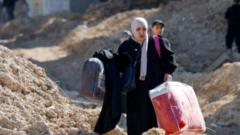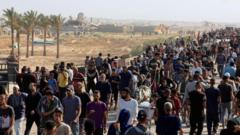Increasing instability and uncertainty have left many families grappling with dire circumstances in the aftermath of extensive military operations.
Israeli Military Operations Displace Thousands in West Bank Camps

Israeli Military Operations Displace Thousands in West Bank Camps
Intense Israeli military actions have led to the forced displacement of around 40,000 Palestinians from multiple camps in the West Bank, raising significant humanitarian concerns.
As the sun sets over the West Bank, the shadows of dislocation and despair loom large for many families. Among them is Alaa Ofi, who describes a life upheaved by recent Israeli military raids — “The army forced us out. Me, my wife, and family. We took nothing with us.” He reflects on the vital documents, clothing, and possessions left behind during the swift evacuation from the Tulkarm refugee camp, where he has lived for years.
Since the onset of Israel’s "Operation Iron Wall," which aims to dismantle Palestinian militant groups, the situation has escalated. This operation has forcibly uprooted approximately 40,000 individuals from four key Palestinian refugee camps in the northern West Bank: Tulkarm, Nur Shams, Jenin, and Far’a. According to humanitarian organizations, this represents the largest mass displacement of Palestinians in this region since the 1967 Six-Day War.
Alaa's worries are compounded by personal circumstances; his wife is due to give birth shortly. “I can’t take her to the hospital because I need the insurance papers and my ID, but they were left behind at home,” he laments. As families flood into makeshift shelters or seek assistance from local authorities, many struggle to find affordable housing amidst the chaos.
The destruction left in the wake of the military operations is evident. Roads have been torn up and homes demolished, with remnants of the once tightly packed Tulkarm camp now a barren landscape patrolled by Israeli soldiers. Civilians report being unable to return home due to ongoing military presence and uncertainties surrounding safety.
UN reports indicate that at least 51 Palestinians, including children, have been killed since the operation commenced. Against this backdrop, a shocking video captured demonstrates the ominous nature of the operation, showcasing a drone broadcasting warnings to residents to vacate their homes.
Defense Minister Israel Katz justified the military operations stating, “We are at war with Islamic terrorism,” and hinted at a prolonged military presence in the area, notably deploying tanks in the Jenin camp for the first time in over two decades. While military officials assert that civilians have the option to evacuate, many residents dispute this, claiming they were compelled to flee under threat.
Dr. Abdullah Kmeil, the newly appointed Palestinian governor of Tulkarm, expressed grave concerns regarding the ramifications of these operations. He described it as “a declaration of war," aiming to instill a sense of lasting fear and disruption among the populace.
As roads remain impassable due to military operations, difficulties are mounting daily for displaced residents. In nearby Qabatiya, vehicle drivers navigate treacherous, muddy potholes left by the operations, while remnants of local culture, such as a model of Jerusalem's Dome of the Rock, lie in ruins.
The fate of the displaced remains uncertain, as families like that of Alaa Ofi face a bleak future. “If we can’t go back to our house for a year, it’s going to be a disaster,” he warns. “We’ll be left stranded in the streets with the kids.” The ongoing strife continues to affect lives profoundly, leaving in its wake a desperate need for a resolution and humanitarian assistance.



















